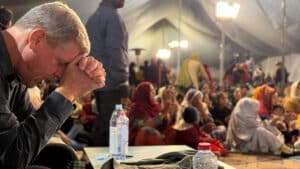Exodus 17:8-15 “The Amalekites came and attacked the Israelites at Rephidim. 9 Moses said to Joshua, “Choose some of our men and go out to fight the Amalekites. Tomorrow I will stand on top of the hill with the staff of God in my hands.”10 So Joshua fought the Amalekites as Moses had ordered, and Moses, Aaron, and Hur went to the top of the hill. 11 As long as Moses held up his hands, the Israelites were winning, but whenever he lowered his hands, the Amalekites were winning. 12 When Moses’ hands grew tired, they took a stone and put it under him and he sat on it. Aaron and Hur held his hands up—one on one side, one on the other—so that his hands remained steady till sunset. 13 So Joshua overcame the Amalekite army with the sword.14 Then the Lord said to Moses, “Write this on a scroll as something to be remembered and make sure that Joshua hears it because I will completely blot out the name of Amalek from under heaven.”15 Moses built an altar and called it The Lord is my Banner.”
This passage contains an excellent image of the church on the move. The adversity of the enemy and the weight of the world bearing down on the people of God. In the midst of the difficulty, God says trust in me, praise me, lift me up as a banner, and move forward; and the people then continue onward working in their God ordained roles to carry out His will.
Moses, the leader/mentor figure in the story, is standing as firm as possible to obey God in both his direction to Joshua and to demonstrate God’s divine intervention in the battle. Just like today’s managers, elders, missionaries, and heads of households, the man (Moses) has a lot going on in this story. Thankfully, it is not on Moses to do it all. God has graciously placed people in his life to whom he can delegate tasks and entrust with the mission.
This is the first time Joshua is mentioned in the Bible. He was charged by Moses to select and lead an army for Israel’s first battle after the exodus from Egypt. He is the boots-on-the-ground, sword-in-hand, ready-to-take-the-land warrior of the story. Joshua believes his leadership has trained him well and will not hesitate to follow orders. The relationship between Joshua and Moses is much like the one called for in the New Testament: the 5-fold leaders have equipped this saint (Joshua) for the work of the ministry. Yet even these two men did not carry out the directions of God alone.
The army with Joshua is a group of like-minded individuals who are carrying out their own God ordained tasks. This army would have been quite ineffective if each member were alone and doing their own thing. We see the same thing today! Christians are not meant to do life alone. We are to encourage one another and help each other take hold of our sphere of influence for the Kingdom; whether that’s business, education, government, media, education, family, or the arts. God has a plan and purpose for each of these segments of society, and we are to work together to integrate it with the promised Kingdom.
Moses still had more men at his disposal. My personal point of conviction in this story came when I contemplated the roles of Aaron and Hur. In this story, they take the position of servants. Understanding God’s mandate to Moses about keeping the staff elevated to ensure Israel’s victory, these two men did everything in their power to make that possible for Moses. They fetched a stool sized stone and held up Moses’ arms, becoming – literally – a support staff. These two were willing and ready to do whatever was needed to keep their leader going.
The role of close personal support is not a one-time occurrence in the Bible. For Jesus, the men and women who opened their homes or provided food for Him and His disciples made the physical work and logistics of His earthly ministry possible. This type of support continued for Paul, Peter, Timothy, many other ministry workers, and it continues today. The people who take this mantle are doubtless a vital support and blessing to those in leadership; without them the burden of ministry can become overwhelming and render good leadership ineffective.
As I mulled over this passage of scripture throughout the past week, I thought, “Who am I in this story?” Depending on what arena of life I consider, I can see myself in each of these roles. As the head of my family, my wife Abby is my main support staff, as well as friends/ mentors and extended family, who help me steer us in the direction God has for us. In my ministry, I have leaders whom I trust implicitly as well as a team of praying, giving, and mentoring supporters who walk with me as I develop partnerships for the ministry and train leaders to take up the task of Kingdom building in their nation of promise.
Each of us have various areas of our lives in which we play different roles. In some battles, we are in leadership and mentoring, like Moses. In others, we are the boots on the ground praying and working alongside others in battle like Joshua or the army. And in some situations, we are providing rest, comfort, and what strength we can give just as Aaron and Hur did for Moses in this story. Each opportunity God gives us a part to play in His Kingdom is unique to us and designed for us. I challenge you to contemplate the role you are in and be open to the roles He is opening to you!















